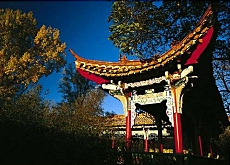
Should Switzerland be the new Singapore?

Is the tourist industry doing Switzerland a disservice by promoting the country abroad as a nation of mountains, cows, cheese and chocolate?
The conservative and rural image often promoted by the tourist board masks progressive changes taking place in the country.
In recent months, Swiss voters have approved the dismantling of the country’s borders with Europe (Schengen accord) and given gays and lesbians partnership rights.
Yet many Europeans do not expect the Swiss to be capable of taking such liberal decisions. They have an image of a stubborn folk, who still gather in town squares to say “no” on almost any issue by a show of hands.
According to Swiss private banker Konrad Hummler, this view of a “backward leaning, ultra-conservative people with an anachronistic understanding of neutrality” is much more widespread than the image of an export-oriented nation with a strong banking sector.
“We don’t do enough advertising abroad to influence the already existing clichés,” Guglielmo Brentel, the newly elected president of the Swiss Hotel Association, told swissinfo.
“If you look at our target markets, we are not doing such a bad job,” he adds. “But a large part of the Swiss tourist industry would be better served if we changed our image.”
Yodel image
The question is whether the tourist industry can get back on the path to growth if it continues to put mountains and yodelling front and centre.
Growth in the industry worldwide is expected to double by 2020, yet visitor numbers to Switzerland peaked in the early 1990s and have dropped significantly since then.
Tourism contributes about SFr4.5 billion ($3.46 billion) to the economy of the Zurich region alone and supports nearly 40,000 jobs, mainly with conferences and trade fairs, business meetings, cultural events and shopping. It benefits little from alpine stereotypes.
“The further away the country is from Switzerland, the more receptive it is to the cliché,” counters Peter Kuhn, a Swiss expert on the global travel market.
“Europeans used to admire the Swiss,” he says, “but now they admire our shrewdness, our ability to pick and choose what’s best for us, ignoring the concerns of others.”
Kuhn does not think much of the idea of repositioning Switzerland as a global-oriented city state instead of an independent nation in the heart of Europe.
City state
“Classic city states like Singapore, Hong Kong or Monaco do not have any interior or back country, which means they have little to offer besides modern services,” he says, adding that the Swiss Alps, while covering only a small area, have nonetheless a high market value.
Kuhn says Switzerland also lacks a major airline hub, seen as a precondition for the economic success of any city state.
Efforts are being made in Swiss banking circles to improve Switzerland’s already well-known image as an international financial centre, since most attempts to bring Switzerland closer politically to the EU have failed and considering the union has lost a lot of its appeal in recent months.
Dynamic melting pot
To set Switzerland apart from the EU, which is no longer seen as the economic force it once was, Hummler envisages a dynamic melting pot with low taxes and little government interference.
Switzerland could then be seen abroad as a shopping paradise. “This could be a realisable scenario if you consider that the introduction of the euro led to a rise in the price of goods in the EU at the same time as protectionist policies are being dismantled here,” Kuhn says.
Guglielmo Brentel does not think the marketing of the national tourist board is in itself responsible for the country’s antiquated image, saying more money actually needs to be made available for promotion.
“As a federal state, we are organised from the bottom up, in contrast to centralised countries like Austria, where the government in Vienna ensures that resources are properly bundled – as is the case with tourist promotion,” he says.
Brentel complains that laws are often made to appease the cantons at the expense of economic interests. “There is the real danger that Europeans will fail to understand us because of our odd structures.”
For that reason, it is understandable when Switzerland is seen as an eccentric country of mountains, cows, cheese and chocolate.
swissinfo, Alexander Künzle
The national tourist board, Switzerland Tourism, receives SFr46 million ($36 million) a year from the government for promotion.
The tourist industry generated SFr20.3 billion in income in 2001, accounting for 5.6% of gross domestic product.

In compliance with the JTI standards
More: SWI swissinfo.ch certified by the Journalism Trust Initiative






























You can find an overview of ongoing debates with our journalists here . Please join us!
If you want to start a conversation about a topic raised in this article or want to report factual errors, email us at english@swissinfo.ch.